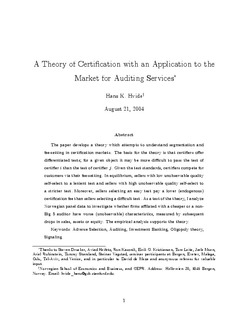| dc.contributor.author | Hvide, Hans K. | |
| dc.date.accessioned | 2006-07-13T07:27:02Z | |
| dc.date.available | 2006-07-13T07:27:02Z | |
| dc.date.issued | 2004-08 | |
| dc.identifier.issn | 1500-4066 | |
| dc.identifier.uri | http://hdl.handle.net/11250/163673 | |
| dc.description.abstract | The paper develops a theory which attempts to understand segmentation and fee-setting in certification markets. The basis for the theory is that certifiers offer differentiated tests; for a given object it may be more difficult to pass the test of certifier i than the test of certifier j. Given the test standards, certifiers compete for customers via their fee-setting. In equilibrium, sellers with low unobservable quality self-select to a lenient test and sellers with high unobservable quality self-select to a stricter test. Moreover, sellers selecting an easy test pay a lower (endogenous) certification fee than sellers selecting a difficult test. As a test of the theory, I analyze Norwegian panel data to investigate whether firms affilated with a cheaper or a non-Big 5 auditor have worse (unobservable) characteristics, measured by subsequent drops in sales, assets or equity. The empirical analysis supports the theory. | en |
| dc.format.extent | 303180 bytes | |
| dc.format.mimetype | application/pdf | |
| dc.language.iso | eng | en |
| dc.publisher | Norwegian School of Economics and Business Administration. Department of Finance and Management Science | en |
| dc.relation.ispartofseries | Discussion paper | en |
| dc.relation.ispartofseries | 2004:10 | en |
| dc.subject | adverse selection | en |
| dc.subject | auditing | en |
| dc.subject | investment banking | en |
| dc.subject | oligopoly theory | en |
| dc.subject | signaling | en |
| dc.title | A theory of certification with an application to the market for auditing services | en |
| dc.type | Working paper | en |
